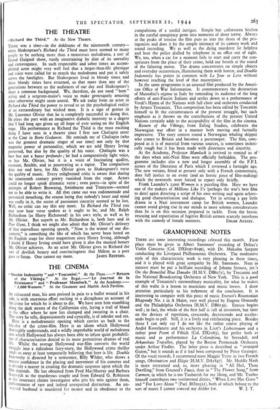THE CINEMA •
" Double Indemnity " and " Toscanini." At the Plaza." Return of the Vikings." At the Regal.—" Le Journal de la Resistance " and " Professor Mamlock." At the Academy. " 2,000 Women." At the Gaumont and Marble Arch Pavilion.
AN exhausted man, his arm pressed in pain to a bullet wound in his side, is with enormous effort reciting to a dictaphone an account of the crime for which he is about to die. We have seen him stumbling along the dark streets of the Californian city, laying a trail of blood to the office where he now lies slumped and sweating in a chair. The story he tells, dispassionately and cynically, is of murder and sex. Here is a melodramatic opening which carries us back to the hey-day of the crime-film. Here is an idiom which Hollywood thoroughly understands, and a wildly improbable world of melodrama into which Hollywood has always been able to infuse quiet probabili- ties of characterisation denied to its more pretentious dramas of real life. Whilst the average Hollywood war-film converts the world struggle into a ridiculous fairy-story, the Hollywood crime thriller sends us away at least temporarily believing that here is life. Double Indemnity is directed by a newcomer, Billy Wilder, who shows a mature confidence in the placing and movement of his cameras and is already a master in creating the dramatic suspense upon which the Min depends. He has obtained from Fred MacMurray and Barbara Stanwyck as the murderous couple and from Edward G. Robinson as the insurance claims investigator who pits his wits against them, performances of rare and indeed unexpected distinction. An un- wanted husband is murdered for money and in obedience to the •
compulsions of a sordid intrigue. Simple but t.nforeseen hitches in the careful conspiracy grow into moments of sheer terror. Always at the peaks of tension the film puts us into the shoes of the pro- tagonists and does it by the simple intimacy of its camera work and sound recording. We as well as the dying murderer lie helpless and hear the police dialled by telephone in an office out of sight. We, too, when a car for a moment fails to start and carry the con- spirators from the place of their crime, hold our breath at the sound of the faltering motor. The drama concentrates on simple objects and everyday occurrences, illuminating them with horror, and Double Indemnity has points in common with Le Your se Leve without however reaching the level of that masterpiece. In the same programme is an unusual film produced by the Ameri- can Office of War Information. It commemorates the destruction of Mussolini's regime in Italy by reminding its audience of the long efforts of anti-Fascist Italians and settles down to a performance of Verdi's Hymn of the Nations with full choir and orchestra conducted by Arturo Toscanini. This composition has been edited by Toscanini himself to fit the circumstances of the present struggle, but such emphasis as it throws on the contributions of the present United Nations certainly adds to the acceptability of the film in the cinema.
Return of the Vikings, from Ealing Studios, celebrates the Norwegian war effort in a manner both moving and factually impressive. The story centres round a Norwegian whaling skipper who comes to Britain and becomes a paratrooper. The film, com- posed as it is of material from various sources, is sometimes techni- cally rough but it has been made with directness and sincerity.
At the Academy, Professor Mamlock is revived to remind us of • the days when anti-Nazi films were officially forbidden. The pro- gramme includes also a new and longer assembly of the F.F.I. scenes of the liberation of Paris which I reviewed a fortnight ago. The new version, fitted at present only with a French commentary, does full justice to an event (and an heroic piece of film-making) which the newsreels were forced to report only briefly.
Frank Launder's 2,000 Women is a puzzling film. Here we have one of the makers of Millions Like Us (perhaps the war's best film to date) again directing a script of his own writing and again achiev- ing good characterisation and dialogue. Yet in setting a gay little drama in a Nazi internment camp for British women, Launder cannot avoid giving rise in our minds to more solemn considerations than he is on this occasion prepared to tackle. Even the heroic rescuing and repatriation of fugitive British airmen scarcely interferes


























 Previous page
Previous page